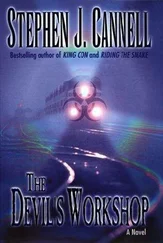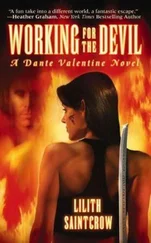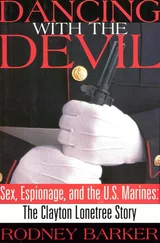Алан Джадд - The Devil's Own Work
Здесь есть возможность читать онлайн «Алан Джадд - The Devil's Own Work» весь текст электронной книги совершенно бесплатно (целиком полную версию без сокращений). В некоторых случаях можно слушать аудио, скачать через торрент в формате fb2 и присутствует краткое содержание. Жанр: sf_mystic, на английском языке. Описание произведения, (предисловие) а так же отзывы посетителей доступны на портале библиотеки ЛибКат.
- Название:The Devil's Own Work
- Автор:
- Жанр:
- Год:неизвестен
- ISBN:нет данных
- Рейтинг книги:3 / 5. Голосов: 1
-
Избранное:Добавить в избранное
- Отзывы:
-
Ваша оценка:
- 60
- 1
- 2
- 3
- 4
- 5
The Devil's Own Work: краткое содержание, описание и аннотация
Предлагаем к чтению аннотацию, описание, краткое содержание или предисловие (зависит от того, что написал сам автор книги «The Devil's Own Work»). Если вы не нашли необходимую информацию о книге — напишите в комментариях, мы постараемся отыскать её.
The Devil's Own Work — читать онлайн бесплатно полную книгу (весь текст) целиком
Ниже представлен текст книги, разбитый по страницам. Система сохранения места последней прочитанной страницы, позволяет с удобством читать онлайн бесплатно книгу «The Devil's Own Work», без необходимости каждый раз заново искать на чём Вы остановились. Поставьте закладку, и сможете в любой момент перейти на страницу, на которой закончили чтение.
Интервал:
Закладка:
She was with him much sooner after Tyrrel's death than I had known. She must have been there during our talks. Although the manuscript still baffled him whenever he looked at it — which he did often though never for long because of the sickening properties of the gibberish — and although the scratching continued, her presence made an immediate difference. Now, when he looked at the manuscript or heard the noise, his head filled with words, scenes, characters, voices and echoes in such profusion that he felt he couldn't contain them. All he could do was to siphon them off through his own pen, writing automatically with hardly a shaping thought of his own. That is how he started the fashion for so-called fictive realism which made him so famous and rich. He had only to sit and wait for the sounds or turn the pages of the gibberish for it all to rush into his head like water from a sluice, and then he had simply to open his pen. As he went on the process became ever easier and he became immensely prolific and successful, as we know; but his own thoughts and his own imagination perished.
It was because of what was happening that he wouldn't move to better premises in those early years. He associated it at first not only with Eudoxie but with those Victorian rooms, and feared to lose it. He still thought he could drop it when he wanted and he was intrigued and excited, enjoying his success. He thought he had stumbled upon something new and persuaded himself that when eventually he returned to his own writing he would be enriched. But he remained wary of discussing it. I made a few attempts after that dinner with Eudoxie, only to find him at first offhand and later brusque, as if he had no time for such nonsense.
Chapter 5
Chantal and I moved to Antibes some months after the birth of our first daughter. I got a job in the lycйe and she was able to work part-time teaching French to foreigners. In the first flush of parental enthusiasm we both felt that London was no place to bring up children. They should live in small towns with easy access to countryside or sea — as should adults, ideally. Also, climate is very important. If it is right it makes everything else better but if it is wrong nothing else will really do and the daily condition of life is struggle.
In fact, the summers in Antibes are too hot for my taste but they suited Chantal. With help from her father, we got an apartment in the same block as her parents. This meant that her sister, Catherine, now a tall and lissom young woman, was available for baby-sitting. So life was pleasant; indeed, being away from London and that dreadful school was like permanent holiday. Work was no longer onerous and stressful but something one just did, like shaving or making coffee. I could walk to the lycйe every day along by the harbour.
Some time after the birth of our second daughter, Edward and Eudoxie moved to Villefranche. They reoccupied Tyrrel's house which I assumed was left to Eudoxie though I did read something in the papers about a will that was disputed by one or two of his former wives; but the wife or wives died and whatever fuss there was fizzled out. Eudoxie had it.
I was delighted, of course, though I did not see as much of Edward as I had thought I would. It is a commonplace that children so weaken friendships that many parents cease to be social beings at all. Meetings and conversations become rather desperate occasions, an exchange of notes and a hurried scramble to run up some semblance of the old self. Chantal and I were more fortunate, not only because we had her family on hand but because she was well-organized and efficient, almost Teutonic. She appreciated that time and space have to be created and that neither occurs if you wait for them, so she made sure that there was always some time in the week for doing what she wanted. I was the more willing to help with this because she understood that I needed the same. Perhaps because neither of us felt ourselves to be a natural parent, whatever that is, we saw to it that things worked.
I saw Edward about once a month. I would get the train or drive to Villefranche, though sometimes he would have reason to be in Antibes and we would meet at M. Englert's. Only once or twice did he come to our flat; the presence of children, even signs of their existence such as toys or the push-chair in the hall, discomforted him. As often with people who have an ambition in life, the whole business of families was irrelevant. Nor did Eudoxie ever show any interest in children though she was, I was told, hospitable and charming when Chantal and Catherine occasionally took them over to Villefranche for an afternoon.
It was at first strange for me to sit in the room where I had seen Tyrrel with his head in his hands. The house was larger than appeared from outside and had a balcony, shielded by the extension from the steps that went down the side of the garden. Edward and I would talk on the balcony in the evenings, looking across the bay to the white buildings of Villefranche. He had put on weight and was fuller in the face. I suppose I was, too, but the journey from youth to early middle age is barely perceptible from within. Anyway, it seemed appropriate that he should put on mote weight than I did since he was more prosperous. Chantal and I were far from hard-up thanks to her father and we lived in an apartment we could never otherwise have afforded, but we were not in the same league as Edward and Eudoxie. Edward's royalties were huge and it is possible that Eudoxie also benefited from a share of Tyrrel's. Several of Edward's books were filmed and he wrote a couple of the scripts himself. They were highly acclaimed but they lacked the almost chaotic energy and fantasy that informed his novels. Despite exotic photography and apparently arbitrary cutting, they were like watered-down versions of the books. He did no more scripts after those two, saying that a film was necessarily a group production rather than the work of an individual and, in any case, was really made in the cutting-room. Certainly, the scripts lacked the peculiarly strong stamp of individuality we used to think of as his.
Our talks became less literary with the years. I imagine this was in part a natural waning of youthful enthusiasm; like other passions, that for things of the mind rarely survives the avalanche of success or, in my case, the accumulation of domestic responsibilities. It was Conrad, I think, who wrote about how good it was, how free, to be young and to have nothing, and I can almost believe it. But to be old and have nothing benefits no one; the silting up of arteries with money and property is not always the malign process that some people think, and the daily accretion of detail, the one-damn-thing-after-another of it all, is more a part of life than all the great themes.
The other reason our talks became less literary was what was happening to Edward. It was not so much that he was distracted by success or circumstance as that a deadliness invaded the very heart of his genius and spread from there to occupy every part of his life, so that in time there was almost nothing for him to oppose it with. In his very struggles to free himself, it was becoming him. As the years passed, I sensed that our talks became more important. This was not because of what was said, since their content was increasingly insubstantial, but because they took place regularly and because I had known him in his early days, before it all started. I was his only contact with his former life, I alone survived his success; nothing else of his past, of himself — really nothing, by the end remained to him.
I was touched and grateful that he appeared so to value our talks but I didn't ask myself why. I accepted them as sessions of mutual reassurance and comfort while in the background his reputation as another Tyrrel blossomed. That had a momentum of its own, seemingly no more to do with him than with me, which in a sense was the case. In the curious way of the media, Edward's self-rationed appearances on radio and television were taken as evidence for rather than against his-having adopted Tyrrel's reclusive mantle, and he was never introduced without being said to have come out of seclusion especially for that programme.
Читать дальшеИнтервал:
Закладка:
Похожие книги на «The Devil's Own Work»
Представляем Вашему вниманию похожие книги на «The Devil's Own Work» списком для выбора. Мы отобрали схожую по названию и смыслу литературу в надежде предоставить читателям больше вариантов отыскать новые, интересные, ещё непрочитанные произведения.
Обсуждение, отзывы о книге «The Devil's Own Work» и просто собственные мнения читателей. Оставьте ваши комментарии, напишите, что Вы думаете о произведении, его смысле или главных героях. Укажите что конкретно понравилось, а что нет, и почему Вы так считаете.











